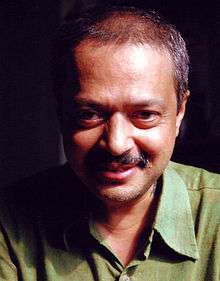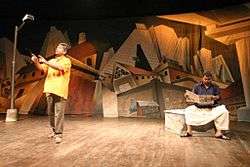Sunil Shanbag
| Sunil Shanbag | |
|---|---|
 Shanbag in Mumbai, 2008 | |
| Born | 7 October 1956 |
| Occupation | Stage director |
| Years active | 1974–present |
Sunil Shanbag (born 1956) is an Indian theatre director, screenwriter and documentary film-maker. He has graduated from Mumbai University, and although he didn't have any formal training in theatre, he has worked extensively with Satyadev Dubey,[1] who considers him one of his foremost protégés.[2]
In 1985, Shanbag founded the theatre company Arpana. Its work is characterised by "contemporary and original texts by Indian and international playwrights (in translation), strong performances, minimalist staging, and innovative use of music and design."[3]
Plays

In 2007, Shanbag directed the critically acclaimed Cotton 56, Polyester 84 which won three META awards at the Mahindra Theatre Festival, including Best Original Script for its writer, Ramu Ramanathan.[3] The play is a celebration of Mumbai, through the culture spawned by rapid industrialisation, specially in the mills of Girangaon.
In 2010, Shanbag opened the play S*x M*rality & Cens*rship.[4] The play revolves around the censorship woes faced by Vijay Tendulkar's Sakharam Binder in Mumbai in 1974, juxtaposing this against the sanitising of tamasha traditions by middle-class conservatism.[5] The play was funded by a grant from the India Foundation for the Arts and underwent research and rehearsals for almost a year.[6] Ultimately, it was nominated for nine awards at the META Awards,[7] with supporting actress Geetanjali Kulkarni finally winning for her performance.[8] In the same year of 2010 he did a play written by Vivek Narayan .Based on Rabindranath Tagore's famous play DAK GHAR (translated into Hindi for this production by Ashok Mishra), and on true incidents from the life of the Polish doctor and storyteller Dr. Janusz Korczak, the play is a poignant tribute to the human spirit that gathers hope, even where there seems to be none. WALKING TO THE SUN is one of his best work . It brings together the dramatic and more vivid style of Indian storytelling with that of the more stark approach of a European work of art. It is both a requiem and a song of hope.
Also in 2010, through his play Dreams of Taleem, Shanbag tried to cope with the death of playwright Chetan Datar by incorporating Datar's play 1, Madhavbaug in a narrative that dealt with the isolation felt by its gay protagonists.[9] According to The Hindu, it did not seem to ask any new questions in the areas of theatre and sexuality, "despite its strong performances and a script that was otherwise quite seamless."[10]
In 2011, Shanbag presented his musical, Stories in a Song. The show was conceived by noted classical vocalist Shubha Mudgal and percussionist Aneesh Pradhan for the 2011 Baaja Gaaja festival in Pune.[11] According to Mumbai Mirror, the stories in the play "reflected the socio-historical times in which they happened, and are lightly lined with satirical or sympathetic comment."[12]
In 2012, Shanbag was invited to perform a Gujarati adaptation of All's Well That Ends Well as part of the Globe to Globe festival in London, in which all 37 of Shakespeare's plays were performed in 37 different languages at Shakespeare's Globe.[13] The play was well received in the UK press, with The Guardian giving it a four-star rating,[14] and the Arts Desk stating, "Shakespeare's problem play is solved by a buoyant Gujarati staging from Mumbai."[15] Titled Maro Piyu Gayo Rangoon in India, the play had previously premiered in Mumbai, with veteran theatre critic Shanta Gokhale describing it as "a truly remarkable achievement".[16] In 2014, the play was invited back to the Globe for another run of shows in a month that marked the 450th birth anniversary of Shakespeare.[17]
Films
Shanbag has worked with Shyam Benegal and was a co-author, along with Shama Zaidi, for the television serials Yatra and Bharat Ek Khoj. In 1993, he produced Maihar Raag, which won the National Film Award for Best Non-Feature Film in 1994.[18]
In 2009, Shanbag directed the short film, The Sword and the Spear, which was based on an international tour undertaken by contemporary dancer Astad Deboo and his troupe of Thang-ta martial arts performers from Manipur.[19]
References
- ↑ "Friday Review Delhi / Theatre : The relentless march of time". The Hindu. Chennai, India. 26 January 2007. Retrieved 16 October 2011.
- ↑ "'Problem with teaching and acting is same as sex' – Rediff.com Movies". Rediff.com. 15 July 2011. Retrieved 16 October 2011.
- 1 2 "Friday Review Delhi / Theatre : Celebration of Mumbai". The Hindu. Chennai, India. 16 March 2007. Retrieved 16 October 2011.
- ↑ "'Several of my plays have run into resistance,' says Sunil Shanbag – Entertainment – DNA". Daily News and Analysis. 7 February 2010. Retrieved 16 October 2011.
- ↑ "'Banning a play is not the solution' – Times of India". The Times of India. 10 October 2001. Retrieved 16 October 2011.
- ↑ Devina Dutt (22 November 2009). "Arts / Theatre : Cynosure of many eyes". The Hindu. Chennai, India. Retrieved 16 October 2011.
- ↑ "S*X, M*Rality, And Cens*Rship | Mahindra Excellence in Theatre Awards". Metawards.com. 5 March 2010. Retrieved 16 October 2011.
- ↑ "Mahindra Excellence in Theatre Awards". Metawards.com. Retrieved 16 October 2011.
- ↑ "city guide and fortnightly listing magazine ::::". Time Out Mumbai. Retrieved 16 October 2011.
- ↑ Deepika Arwind (19 April 2010). "Arts / Theatre : Seeking answers". The Hindu. Chennai, India. Retrieved 16 October 2011.
- ↑ Vikram Phukan. "Hindustani music in bite-sized morsels". Firstpost. Retrieved 16 October 2011.
- ↑ "Voice on centerstage, Columnists – Shanta Gokhale". Mumbai Mirror. Retrieved 16 October 2011.
- ↑ Andrew Dickson (20 April 2012). "World Shakespeare festival: around the Globe in 37 plays". The Guardian. London. Retrieved 1 June 2012.
- ↑ Andrew Dickson (1 June 2012). "All's Well That Ends Well – review". The Guardian. London. Retrieved 1 June 2012.
- ↑ Matt Wolf. "Globe to Globe: All's Well That Ends Well, Shakespeare's Globe". The Arts Desk. Retrieved 1 June 2012.
- ↑ Shanta Gokhale (17 May 2012). "All's well that ends well". The Times of India. Mumbai, India. Retrieved 16 October 2011.
- ↑ Vikram Phukan (26 April 2014). "Happy ending". Mumbai, India: Livemint. Retrieved 6 August 2014.
- ↑ "Breaking new ground". The Telegraph. Calcutta, India. 27 July 2008. Retrieved 16 October 2011.
- ↑ Savitha Gautam (16 October 2009). "Arts / Dance : Moving beyond the stage". The Hindu. Chennai, India. Retrieved 16 October 2011.
